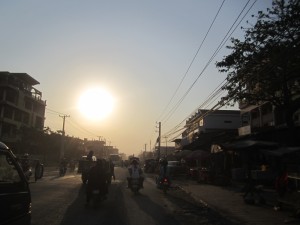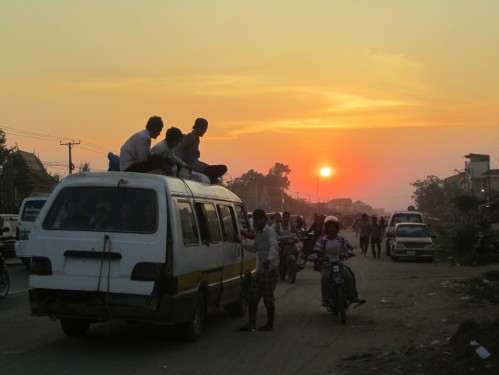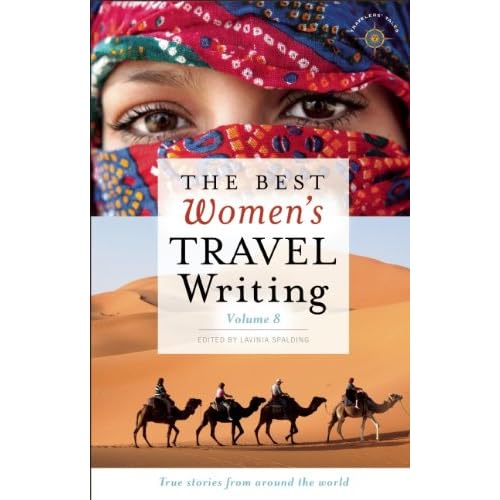 Wednesday morning, post-jog Skype sesh: sitting in my robe, cup of coffee, laptop in my lap, feeling all warm and good after a shower and a bowl of pho.
Wednesday morning, post-jog Skype sesh: sitting in my robe, cup of coffee, laptop in my lap, feeling all warm and good after a shower and a bowl of pho.
Routines are one of my favorite things (because I’m officially old and boring). Watching the routines emerge in my new life here in Hanoi has been a sweet, kinda precious thing. And one of my favorites are Wednesday mornings. It’s my only weekday morning off right now, so I force myself to make the most of it: wake up at 6am to go jogging before the worst of the heat presses down. It doesn’t really help much; after ten minutes I’m a fucking slip-and-slide of sweat and after twenty minutes I’m woozy from the heat. It’s really more of an excuse to get up early—cause as it turns out, dawn is one of my favorite times in Asia and who really says, “I’m getting up early to go strolling”? Well, most of SE Asia, judging from how many people are out and about, stretching their limbs and buying vegetables and sitting on little plastic stools drinking tea. But not me—I’m the giant, red-faced tattooed girl ducking from all the low-hanging tree branches, curly fro flopping in the breeze. (Majestic, really.)
Anyway, I do that for twenty minutes and after I’m sweaty and disgraced enough, I go down the block and get a bowl of pho, stroll over to the market and buy some fruit, stop for a coffee, come home, shower, BLAH BLAH BLAH and I’m on the computer and (in theory) ready to write by 8am. Killer.
Except 8am here is 6pm on the West Coast, 9pm on the East, and a reeeeeally good time to catch up with friends. So I end up chitty-chatting for a couple hours, that Word document slowly getting buried behind Skype and IM and FB windows. Like most writers, I feel a sense of urgent, impending failure unless I’m writing 2000 words a day, but I try to reassure myself that maintaining connections with folks back home is important. Because I love my friends, but also because they know, really know me, in a way I often don’t know myself. (And besides, I enjoy the fuck out of a witty IM.)
So this morning I’m Skyping with a friend in Oakland. She’s telling me about this nightclub debacle and I’m telling her about my wading-through-sewage debacle and we’re laughing and shit. And then she goes, “You sound so much happier!”
Okay, so this is like fourth time I’ve heard this from someone. Granted, they’re not here in person and all they’ve had to go on for the past 10 months has been my voice, maybe a grainy little video box that freezes a lot and makes my skin look yellow. But still, I think there’s something to that. You know how they say when one sense is shut down, the others become heightened? Like blind people are supposed to have mad good hearing? I don’t know if this is true but I like the sound of it and it goes along with my theory, so let’s assume. Cause it would then follow that if your only contact with someone is through their voice, you’d get pretty good at reading and gaging it.
So I tell her, “Yeah, you’re like the fourth person who’s told me that.”
And she goes, “Well do you feel happier?”
I answer without missing a beat: “Totally.”
Now, the transition to Hanoi has been turbulent. I don’t find Hanoi a particularly accommodating city, and I had to hit the ground running. I’ve had more demoralizing breakdowns in my move to Hanoi than I did in Phnom Penh, and the air is worse and the traffic is mental and I think it might actually be hotter here.
But it’s true, I’m happier. I’m happier in this hard-to-name, only-vaguely-aware-of way, in the same way hard-to-name, only-vaguely-aware-of way I was UNhappy in Phnom Penh.
I’ve been trying not to talk about it too much. One, because you don’t really wanna sound like a smug bastard and two, because I don’t know how to explain it. Why am I happier here? Life is easier in Phnom Penh in a lot of ways—it’s a smaller city, it’s less polluted, there’s more access to foreign products, food is less expensive, people are damn friendly, there’s tuk-tuks, etcetcetc. People here have asked me, you know, what was Phnom Penh like, why did I go there, why did I leave, and I usually just shrug and say, “Hanoi’s a better fit for me.”
So I keep chatting with my friend, then I pop on FB and holy shit, Angelo’s online. So we start IMing, about curly fries and an on-the-job fender bender and some ridiculous Champagne Party an eccentric millionaire gives, when holy shit, ANOTHER friend pops up. (Cause I am so damn popular. In online life.)
It’s this dude I knew in Cambodia. He left before I did, in March, and we haven’t talked since then. So I’m bouncing between windows—curly fries, Cambodia, curly fries, Cambodia—when Dude goes: “I’ve been reading your blog.” Like. “It’s funny.” Like. “And negative.”
Wait, what?
“Negative?”
“It’s all about how hard everything is and how bummed you’ve been.”
Damn.
I’ve been trying to walk this line between being honest and being a total fucking Negative Nancy. Cause right now, to be honest, I’m pretty down on Cambodia. But I’ve been trying to keep my mouth shut about it, cause I know it’ll pass and that really, that’s not how I actually feel. It’s just that it’s really fresh; it’s like I was dating someone and I got burned.
Cause I didn’t hate Cambodia. It wasn’t some shithole with no redeeming qualities that I was absolutely miserable in. There were things I loved about Cambodia, loved in that full-body, heart’s-gonna-leap-outta-your-chest way that you can’t quite explain. I friggin moved there, from across the planet.
But things didn’t go well for me there. I went with big dreams and they totally fell through. I had to work my ass off at staying emotionally balanced and healthy, and as dramatic as it sounds, I feel like I narrowly escaped with my sanity. I loved Cambodia and it broke my fucking heart. That’s not Cambodia’s fault and it’s not mine. But it’s easier to be negative about it, to keep a mental inventory of everything that’s more developed and better here—and there’s a lot—because I’m still too close to it to look at the full picture. It doesn’t yet feel safe to delve into the complexities of why Cambodia didn’t work for me or what exactly happened to me there. Maybe it won’t ever be safe—that’s another thing I learned in my time there: that some things aren’t safe in delve into. Why did this thing or that thing happen? In a way it doesn’t matter. I’m not a psychologist; I’m not a historian; I’m not a policy maker. What would the knowledge of why do for me? “If you understand, things are as they are. If you don’t understand, things are as they are.”
I’ve been thinking all this, secretly. But not-so-secretly, it would seem. Totally fucking obviously, perhaps.
So, what I’ve learned from this morning’s Skype/FB/IM marathon: I’m happier in Hanoi; I’m down on Cambodia.
Not exactly late-breaking news. But the truth.















Recent Comments